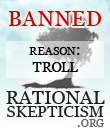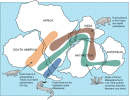Lawrence Krauss vs William Lane Craig
"Has science buried god?" Debate/Discussion in Brisbane on August 7th, 2013
Moderators: kiore, Blip, The_Metatron
Lawrence Krauss vs William Lane Craig
One of the discussions where Lawrence Krauss exposed the dishonesty and disingeniousness of William Lane Craig.
- stillwater
- THREAD STARTER
- Posts: 68


Re: Lawrence Krauss vs William Lane Craig
I really don't know why Craig gets all these gigs. Maybe he is the one chosen to speak eloquently? But he only ever had one argument: first cause.
How American politics goes
1 Republicans cut tax, let everything run down to barely working...8 years
2 Democrats fix public spending to normal...8 years
Rinse, repeat.
1 Republicans cut tax, let everything run down to barely working...8 years
2 Democrats fix public spending to normal...8 years
Rinse, repeat.
-

Tero - Posts: 1426
- Country: USA
Re: Lawrence Krauss vs William Lane Craig
stillwater wrote:One of the discussions where Lawrence Krauss exposed the dishonesty and disingeniousness of William Lane Craig.
Hell, WLC does that himself every time he opens his mouth...
Atheism alone is no more a religion than health is a disease. One may as well argue over which brand of car pedestrians drive.
- AronRa
- AronRa
- MrFungus420
- Posts: 3914
Re: Lawrence Krauss vs William Lane Craig
is this a second debate between them cuz Krauss sucked on the first one.
-

sturmgewehr - Posts: 264

Re: Lawrence Krauss vs William Lane Craig
Any reviews ?
Between what i think , what i want to say ,what i believe i say ,what i say , what you want to hear , what you hear ,what you understand...there are lots of possibilities that we might have some problem communicating.But let's try anyway.
Bernard Werber
Bernard Werber
-

IIzO - Posts: 2182
- Country: La France , evidement.

Re: Lawrence Krauss vs William Lane Craig
IIzO wrote:Any reviews ?
There's a summary here, from someone who seems to be a Christian but is pretty evenhanded in his appraisal:
http://eternitainment.com/2013/08/10/co ... uried-god/
TBH, what that suggests to me is that there are likely better uses of my time than watching the debate....
"A community is infinitely more brutalised by the habitual employment of punishment than it is by the occasional occurrence of crime." -Oscar Wilde
-

Shrunk - Posts: 26170
- Age: 59

- Country: Canada

Re: Lawrence Krauss vs William Lane Craig
Tero wrote:I really don't know why Craig gets all these gigs. Maybe he is the one chosen to speak eloquently? But he only ever had one argument: first cause.
Um. He deploys many more arguments.
Christ said, "I am the Truth"; he did not say "I am the custom." -- St. Toribio
-

Mick - Banned Troll
- Posts: 7027
Re: Lawrence Krauss vs William Lane Craig
In the article linked by Shrunk, the author says Krauss stated that science discovered no gods were responsible for the laws of nature. That is false. Final causation and contingency are not even considered by science, let alone its methodological naturalism excludes any such theistic explanations in the first place.
Christ said, "I am the Truth"; he did not say "I am the custom." -- St. Toribio
-

Mick - Banned Troll
- Posts: 7027
Re: Lawrence Krauss vs William Lane Craig
That’s a long video to watch, I may do it, I just don’t have 2 hours to spare right now.
Perhaps someone who’s watched it can tell me...
Did WLC “talk” god into existence yet?
Perhaps someone who’s watched it can tell me...
Did WLC “talk” god into existence yet?
-

Skinny Puppy - Name: Sherlock Jeffrey Puppy
- Posts: 9399
- Age: 40


Re: Lawrence Krauss vs William Lane Craig
Mick wrote:In the article linked by Shrunk, the author says Krauss stated that science discovered no gods were responsible for the laws of nature. That is false. Final causation and contingency are not even considered by science, let alone its methodological naturalism excludes any such theistic explanations in the first place.
You seem to be saying science hasn't discovered gods because scientists aren't looking for them.
Neither final causation nor contingency can be tested. And, in fact, the former makes no sense in light of evolution since there is no end product. I'm sure it was more plausible when the world was fixed and static but we're, most of us, well beyond that.
So where to look next?
A most evolved electron.
-

Animavore - Name: The Scribbler
- Posts: 45107
- Age: 45


Re: Lawrence Krauss vs William Lane Craig
Mick wrote:Tero wrote:I really don't know why Craig gets all these gigs. Maybe he is the one chosen to speak eloquently? But he only ever had one argument: first cause.
Um. He deploys many more arguments.
And on top of all those arguments, is the personal feeling of god's existence, which trumps any successful counter arguments.
There is definitely much more than the first cause, i agree.
-

Ihavenofingerprints - Posts: 6903
- Age: 31


Re: Lawrence Krauss vs William Lane Craig
Animavore wrote:Mick wrote:In the article linked by Shrunk, the author says Krauss stated that science discovered no gods were responsible for the laws of nature. That is false. Final causation and contingency are not even considered by science, let alone its methodological naturalism excludes any such theistic explanations in the first place.
You seem to be saying science hasn't discovered gods because scientists aren't looking for them.
Neither final causation nor contingency can be tested. And, in fact, the former makes no sense in light of evolution since there is no end product. I'm sure it was more plausible when the world was fixed and static but we're, most of us, well beyond that.
So where to look next?
Suppose it is true that final causation and contingency cannot be tested. Presumably, you think falsifiability is necessary. Thus, it follows that science cannot deal with that stuff, but that doesn't imply its non-presence.
That said, the abandonment on final causation was not in light of some rebuttal. You have no scientific basis for affirming that. A familiarity with the history science will tell you that much. This was a switch in models. That said, there were plenty of teleological understandings of evolution, and nothing about evolution entails mechanical philosophy alone.
Christ said, "I am the Truth"; he did not say "I am the custom." -- St. Toribio
-

Mick - Banned Troll
- Posts: 7027
Re: Lawrence Krauss vs William Lane Craig
FIFY.
"Respect for personal beliefs = "I am going to tell you all what I think of YOU, but don't dare retort and tell what you think of ME because...it's my personal belief". Hmm. A bully's charter and no mistake."
-

Thomas Eshuis - Name: Thomas Eshuis
- Posts: 31091
- Age: 34

- Country: Netherlands

Re: Lawrence Krauss vs William Lane Craig
Shrunk wrote:IIzO wrote:Any reviews ?
There's a summary here, from someone who seems to be a Christian but is pretty evenhanded in his appraisal:
http://eternitainment.com/2013/08/10/co ... uried-god/
TBH, what that suggests to me is that there are likely better uses of my time than watching the debate....
This bit damages the author's credibility:
Following that, Krauss restated his commitment to honesty and transparency, before presenting some instances where Craig has supposedly misrepresented others. This segment in fact had no relevance to the central topic. The move was out of a politician’s playbook, playing the man and not the argument.
Attacking an opponents previous statements on their disengenuous nature is not a personal attack and eery much a play on their arguments.
"Respect for personal beliefs = "I am going to tell you all what I think of YOU, but don't dare retort and tell what you think of ME because...it's my personal belief". Hmm. A bully's charter and no mistake."
-

Thomas Eshuis - Name: Thomas Eshuis
- Posts: 31091
- Age: 34

- Country: Netherlands

Re: Lawrence Krauss vs William Lane Craig
stillwater wrote:One of the discussions where Lawrence Krauss exposed the dishonesty and disingeniousness of William Lane Craig.
"This video is private"
"Respect for personal beliefs = "I am going to tell you all what I think of YOU, but don't dare retort and tell what you think of ME because...it's my personal belief". Hmm. A bully's charter and no mistake."
-

Thomas Eshuis - Name: Thomas Eshuis
- Posts: 31091
- Age: 34

- Country: Netherlands

Re: Lawrence Krauss vs William Lane Craig
Animavore wrote:Mick wrote:In the article linked by Shrunk, the author says Krauss stated that science discovered no gods were responsible for the laws of nature. That is false. Final causation and contingency are not even considered by science, let alone its methodological naturalism excludes any such theistic explanations in the first place.
You seem to be saying science hasn't discovered gods because scientists aren't looking for them.
Neither final causation nor contingency can be tested. And, in fact, the former makes no sense in light of evolution since there is no end product. I'm sure it was more plausible when the world was fixed and static but we're, most of us, well beyond that.
So where to look next?
Here's what's odd. You said that final causation cannot be tested, and yet apyou also said that evolution has no "
End product" . But if final causation cannot be tested, you cannot say evolution has no 'end product', since that could be affirmed only if it were testable.
Christ said, "I am the Truth"; he did not say "I am the custom." -- St. Toribio
-

Mick - Banned Troll
- Posts: 7027
Re: Lawrence Krauss vs William Lane Craig
Mick wrote:Animavore wrote:Mick wrote:In the article linked by Shrunk, the author says Krauss stated that science discovered no gods were responsible for the laws of nature. That is false. Final causation and contingency are not even considered by science, let alone its methodological naturalism excludes any such theistic explanations in the first place.
You seem to be saying science hasn't discovered gods because scientists aren't looking for them.
Neither final causation nor contingency can be tested. And, in fact, the former makes no sense in light of evolution since there is no end product. I'm sure it was more plausible when the world was fixed and static but we're, most of us, well beyond that.
So where to look next?
Here's what's odd. You said that final causation cannot be tested, and yet apyou also said that evolution has no "
End product" . But if final causation cannot be tested, you cannot say evolution has no 'end product', since that could be affirmed only if it were testable.
Nonsense. Evolution has no end product since it's not a concious process. There is no goal and hence no end product.
"Respect for personal beliefs = "I am going to tell you all what I think of YOU, but don't dare retort and tell what you think of ME because...it's my personal belief". Hmm. A bully's charter and no mistake."
-

Thomas Eshuis - Name: Thomas Eshuis
- Posts: 31091
- Age: 34

- Country: Netherlands

Re: Lawrence Krauss vs William Lane Craig
Mick wrote:Animavore wrote:Mick wrote:In the article linked by Shrunk, the author says Krauss stated that science discovered no gods were responsible for the laws of nature. That is false. Final causation and contingency are not even considered by science, let alone its methodological naturalism excludes any such theistic explanations in the first place.
You seem to be saying science hasn't discovered gods because scientists aren't looking for them.
Neither final causation nor contingency can be tested. And, in fact, the former makes no sense in light of evolution since there is no end product. I'm sure it was more plausible when the world was fixed and static but we're, most of us, well beyond that.
So where to look next?
Here's what's odd. You said that final causation cannot be tested, and yet apyou also said that evolution has no "
End product" . But if final causation cannot be tested, you cannot say evolution has no 'end product', since that could be affirmed only if it were testable.
Meaningless gibberish. One need only understand the process of evolution and it becomes obvious why it doesn't have an end-product.
Half-Life 3 - I want to believe
-

Rumraket - Posts: 13264
- Age: 43
Re: Lawrence Krauss vs William Lane Craig
Mick wrote:Animavore wrote:Mick wrote:In the article linked by Shrunk, the author says Krauss stated that science discovered no gods were responsible for the laws of nature. That is false. Final causation and contingency are not even considered by science, let alone its methodological naturalism excludes any such theistic explanations in the first place.
You seem to be saying science hasn't discovered gods because scientists aren't looking for them.
Neither final causation nor contingency can be tested. And, in fact, the former makes no sense in light of evolution since there is no end product. I'm sure it was more plausible when the world was fixed and static but we're, most of us, well beyond that.
So where to look next?
Suppose it is true that final causation and contingency cannot be tested. Presumably, you think falsifiability is necessary. Thus, it follows that science cannot deal with that stuff, but that doesn't imply its non-presence.
That said, the abandonment on final causation was not in light of some rebuttal. You have no scientific basis for affirming that. A familiarity with the history science will tell you that much. This was a switch in models. That said, there were plenty of teleological understandings of evolution, and nothing about evolution entails mechanical philosophy alone.
Yes. Falsibility is necessary if you want your arguments to be worth any more than those people on Ancient Aliens who think they have a case because we can't prove that aliens didn't build the pyramids. Because, and let's be honest here, when all is said and done, for all the arguments theists present, when pushed, they all resort and lead back to absence of evidence isn't evidence of absence. This is the corner you stand so against staunchly with your back toward.
Also, nothing in evolution entails anything more than a mechanical explanation. Sure you can add your own wispy, ill-defined metaphysical addendum but they all amount to tinsel on the evolutionary tree.
A most evolved electron.
-

Animavore - Name: The Scribbler
- Posts: 45107
- Age: 45


Re: Lawrence Krauss vs William Lane Craig
Mick wrote:Animavore wrote:Mick wrote:In the article linked by Shrunk, the author says Krauss stated that science discovered no gods were responsible for the laws of nature. That is false. Final causation and contingency are not even considered by science, let alone its methodological naturalism excludes any such theistic explanations in the first place.
You seem to be saying science hasn't discovered gods because scientists aren't looking for them.
Neither final causation nor contingency can be tested. And, in fact, the former makes no sense in light of evolution since there is no end product. I'm sure it was more plausible when the world was fixed and static but we're, most of us, well beyond that.
So where to look next?
Here's what's odd. You said that final causation cannot be tested, and yet apyou also said that evolution has no "
End product" . But if final causation cannot be tested, you cannot say evolution has no 'end product', since that could be affirmed only if it were testable.
You only have to look at people's children to know there is no end product.
A most evolved electron.
-

Animavore - Name: The Scribbler
- Posts: 45107
- Age: 45


Who is online
Users viewing this topic: No registered users and 1 guest